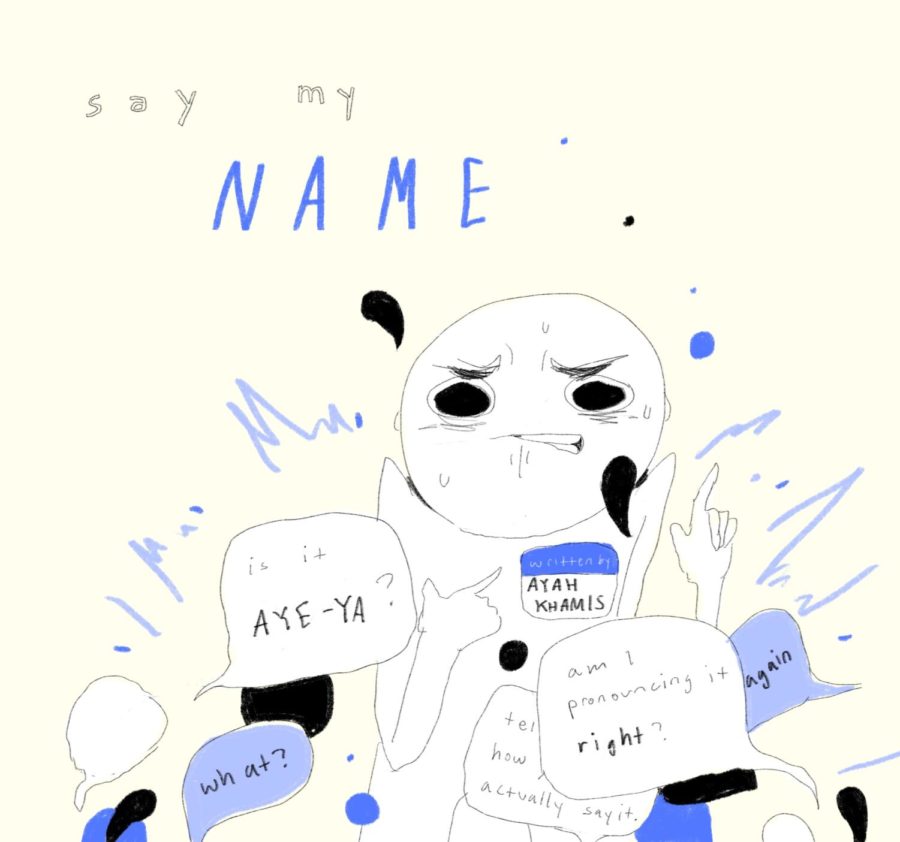Say My Name
The start of a new school year is a fresh start for all students – new teachers, new classes, and the awkward ordeal many students relate to: teachers trying to pronounce names. Students usually correct the teacher and they may or may not pronounce their name correctly, but everyone eventually moves on. According to the National Education Association, the act of mispronouncing names can be viewed as a microaggression – an act of discrmination. This topic can be uncomfortable to talk about and faced with many strong opinions – Who even cares if someone’s name is mispronounced? Why does it matter – it is not even that deep? Why are people being so sensitive? – you get the idea.
To be honest, being someone who has had their name constantly mispronounced since preschool, I am so used to having my name mispronounced that I have become indifferent towards it. Others argue that students who face this problem should care and have their right to have their name pronounced.
A 2012 published study titled “Teachers, Please Learn Our Names!: Racial Microaggressions and the K-12 Classroom,” conducted a qualitative study with participants who identified as Black, Latina/o, Asian American, Pacific Islander, Indigenous, Middle Eastern or mixed race and attended US K-12 schools, and had a story about the mispronunciation or changing of their name in their educational career. The experiment concluded that when a student’s name is mispronounced, it results in students shifting their self-perceptions and believing that their culture or identity is an inconvenience. Many participants also shared they experienced a great amount of anxiety and felt that they were a burden from the problems they faced with their names.
This study led me to the overall question: Should students really make the effort to continue to correct those who mispronounce their names or should they let it go?
It really depends on how the teacher reacts to the students’ name.
To start, it is fair to say most teachers do not intentionally mispronounce students’ names. A lot of teachers are willing to correct themselves and learn how to properly pronounce a students’ name, even if they are unsuccessful. The student has every right to correct the teacher as well. Teachers are not pronunciation experts, and it is understandable that if they see a name that is unfamiliar to them, they will struggle pronouncing it. With this in mind, teachers who are willing to take the time to learn the correct pronunciation show that they care about the students’ names and want them to feel comfortable, despite whether or not they eventually pronounce the name correctly.
A lot of students will choose to consistently correct the teacher until one of them decides to give up: the student will tell the teacher that their name is being said right (even though it isn’t) or the teacher will keep trying but is failing and will settle on a name that they feel is best. For both sides, it saves time and puts an end to the back-and-forth tossing of the name. A lot of people view this as the student giving up on their identity and surrendering to whatever makes the teacher feel comfortable.
There are students who have unfortunately dealt with ignorance amidst their name pronunciation. Students can be negatively impacted by mispronunciations if their name is being mocked, the pronunciation is being laughed at, the student is asked to go by a nickname the teacher created, or making a spectacle of their name. Some teachers are genuinely not trying to be disrespectful, but they give the impression that they do not want to take the challenge to learn a name outside of their own comfort zone. Students may end up losing excitement from their background and language and grow up feeling ashamed of their name.
One of the participants from the research, a Sri Lankan American named Ahilan explained that his first grade teacher’s mispronunciation of his name lasted with him all the way through college. Ahilan expressed: “Ahilan was mispronounced brutally by my first grade teacher, leading me to adopt that mispronunciation and use it all through high school and college.… To this day it causes confusion and embarrassment for me with my friends and others.… Numerous people asked me to shorten it, or just shortened it for me… It made me feel that it was an imposition on others for them to learn my name; it made me feel embarrassed to have it.”
All of our names have a deeper meaning and reflect our cultural background. It connects us to our identity, homeland, or family’s history. We all should be proud of our names and take pride in our identities. Creating a joke out of a students’ name pronunciation can insinuate that the students’ culture is not being respected. Some students who have their names mispronounced might even feel embarrassed or ashamed of their names, which overall affects their self-worth. A lot of people with names that are not familiar end up giving themselves a nickname far from their true name to avoid correcting people.
In the end, it comes down to the person with the name: Will you keep correcting or will you continue with the “name game?”


